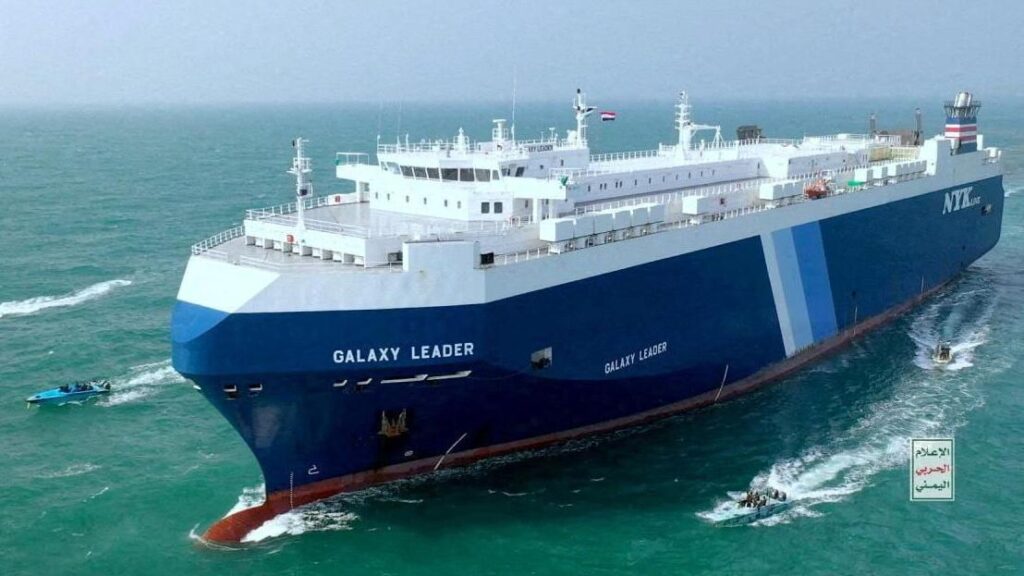Yemen’s Houthi movement has released the crew of the cargo ship Galaxy Leader, which it seized in November 2023 at the start of a campaign of attacks on Red Sea shipping linked to the Gaza war.
The 25 Filipinos, Mexicans, Romanians, Bulgarians and Ukrainians have been detained since Houthi fighters used a helicopter to board the Bahamas-flagged vehicle carrier as it sailed from Turkey to India.
Houthi-run Al Masirah TV said the crew had been handed over to Oman “in support of the ceasefire agreement in Gaza” between Hamas and Israel, which started on Sunday.
The release comes after months of diplomacy involving their countries, as well as the UN’s International Maritime Organization (IMO).
The news was welcomed by the IMO’s Secretary-General, Arsenio Dominguez, who said: “This is a moment of profound relief for all of us – not only for the crew and their families, but also to the wider maritime community.”
“Today’s breakthrough is a testament to the power of collective diplomacy and dialogue, recognizing that innocent seafarers must not become collateral victims in wider geopolitical tensions,” he added.
The UN Special Envoy for Yemen, Hans Grundberg, said: “This is a step in the right direction, and I urge [the Houthis] to continue these positive steps on all fronts, including ending all maritime attacks.”
The 25 crew members are from the Philippines, Mexico, Romania, Bulgaria and Ukraine [AFP]
Over the past 14 months, the Houthis have targeted dozens of merchant vessels with missiles, drones and small boat attacks in the Red Sea and the Gulf of Aden. As well as seizing the Galaxy Leader, they have sunk two vessels and killed four crew members.
They have said they are acting in support of the Palestinians in the war between Israel and Hamas in Gaza, and have claimed – often falsely – that they are targeting ships only linked to Israel, the US or the UK.
The Galaxy Leader was being operated by the Japanese shipping line NYK when it was seized.
The vessel is owned by Galaxy Maritime Ltd, which is registered in the Isle of Man. It is in turn owned by Ray Car Carriers, which is co-owned by Israeli businessman Abraham Ungar, according to documents from the Isle of Man Government’s Companies registry.
The Houthis have not been deterred by the deployment of Western warships in the Red Sea and Gulf of Aden to protect merchant vessels, or by US and British air strikes on territory they control in north-western Yemen.
Israel has also carried out air strikes against the Houthis since July in retaliation for the 400 missiles and drones that the Israeli military says have been launched at the country from Yemen, most of which have been shot down.
On Sunday, the Houthis signalled that they would limit their attacks on shipping in response to the ceasefire in Gaza.
An email sent to shipowners, insurers and others said they were lifting its sanctions on ships except those registered in Israel or wholly owned by Israeli individuals and entities, according to the Financial Times.
The sanctions on wholly Israeli-owned vessels would be stopped “upon the full implementation of all phases” of the ceasefire deal, it added.
Houthi leader Abdul Malik al-Houthi warned in a speech the following day that the group’s actions were dependent on Israel’s commitment to the ceasefire in Gaza.
“We are in constant readiness to intervene immediately at any time the Israeli enemy returns to escalation, genocidal crimes and siege of the Gaza Strip,” he said.
The Houthis’ attacks have led many shipping companies to avoid routes taking their vessels through the Suez Canal, which reduces journey times between Asia and Europe. Before the attacks about 12% of global trade was estimated to use the route.
Instead, shipping companies have been using the longer and more expensive route around the southern tip of Africa.
Last year, the boss of Danish shipping giant Maersk, Vincent Clerc, told the BBC: “We have ships that are being shot at. We have colleagues whose lives are at risk when this happens and we can simply not justify sailing through these dangerous zones.”
The World Shipping Council, a trade body representing the majority of the world’s big shipping lines, welcomed the release of the Galaxy Leader’s crew as an “immense relief”.
“The detention of innocent seafarers is completely unacceptable and illegal,” said its CEO, Joe Kramek. “The situation in the Red Sea has highlighted the critical need for safe and open maritime routes to protect seafarers and keep global trade moving.”
He added that while recent developments were encouraging, many challenges remained before operations could return to normal.
Read the full article here
